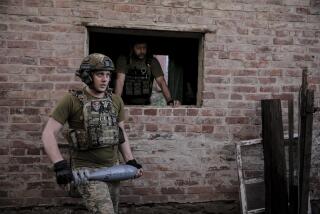Member of Parliament Speaks in Anaheim : Briton Calls U.S. Raid Against Libya a Success
- Share via
Not only have the dire consequences predicted in the wake of the United States’ raid on Libya last April failed to occur, but in many cases the exact opposite of what was expected has happened, a noted member of the British Parliament said Wednesday.
Instead of setbacks in its relations with European allies, the Soviet Union and Arab countries in the Middle East, the United States has experienced improvements, according to Sir Eldon Griffiths.
In what he said he hoped was a mature and objective assessment, made with the benefit of the four months that have elapsed since the massive air strikes against Col. Moammar Kadafi, Griffiths told the World Affairs Council of Orange County on Wednesday night that not only was the attack justified but it was a political as well as military success.
“First and foremost because you drew a line--you laid down a marker--against state-sponsored terrorism,” Griffiths said in prepared remarks. “No nation which may seek to export terrorism henceforth is going to cross that line with immunity.”
Before the Libyan raids, Griffiths said, countries involved in terrorist activities did not believe repeated warnings that “their conduct wouldn’t go unpunished. Since Libya, they have been left in no doubt.”
Griffiths, a former journalist with Time, Life and Newsweek magazines before returning to England to be elected to the House of Commons in 1964, represents Suffolk, where two of the three bases from which the U.S. raiders took off are located. He also serves as an adviser to the British police on terrorism.
In an interview before his speech at the Anaheim Marriott Hotel, Griffiths ticked off a number of little-known details of events leading up to, during and after the raid, which he called the longest tactical air strike in history.
As a way to maintain security and the element of surprise, according to Griffiths, no date was typed on the final orders for the attack. Instead, he said, it was written in later by the secretary of the Air Force, who moved the time for the strike up 24 hours, and then orders were hand-delivered to the U.S. commanders by a four-star general.
Although there were 160 Navy planes aboard two U.S. aircraft carriers off the coast of Libya, Griffiths said, it was decided that the Air Force’s F-111 bombers, with special equipment that would allow precision air strikes, were better suited to the mission.
“Quite likely the Navy could have taken on the whole of the Libyan air force,” Griffiths said. “But it could not guarantee to do this within the political constraints laid down by the President, namely that collateral damage--civilian casualties--must be kept to an absolute minimum.”
Griffiths lamented the fact that “while Libya was able to milk the consequences of one--repeat one--U.S. bomb having gone astray, causing civilian damage that everyone must regret, the Air Force was not able to reveal, as it could and should have, the unmistakable evidence that the F-111s had struck, with a remarkable degree of accuracy, every one of the terrorist targets set for the them by the President.”
In fact, Griffiths said, four of the nine planes assigned to attack Kadafi’s personal headquarters aborted their bombing runs because they feared the possibility of inflicting large-scale damage to the surrounding civilian residential areas.
“So, with what I personally consider to have been remarkable restraint and discipline, the pilots . . . obey their orders to the letter, they abort the attack rather than run the risk of massive civilian casualties,” Griffiths said. “Instead they wheel out to sea, the bombs they have brought . . . still on board.”
One critical factor in the success of the mission, Griffiths said, was “the men on the spot--on the job--were allowed to carry out their orders without the counterproductive micro-management that President Carter, for example, imposed on the military in the course of the U.S. attempt to rescue the American hostages from Iran. President Reagan approved the action, and they stayed out of the way.”
In the aftermath of the raid, Griffiths said, there were dire warnings that the attack not only would unite the Libyan people behind Kadafi and rally the Arab world to his cause, but that it would drive a wedge between the U.S. and its European allies, as well as give the Soviet Union an excuse to back off from serious talks on arms limitations.
Instead, Griffiths said, there is evidence of unrest in Libya, that Kadafi is undergoing psychiatric treatment in the wake of the raid and that his lieutenants are assuming more and more power.
Additionally, it appears that “far from the Arab states offering practical aid to Libya, most of them have distanced themselves from the Kadafi regime,” Griffiths said. “This is particularly true of Egypt and Sudan to the east and Morocco, Algeria and Tunis to the west.”
The Russians, meanwhile, have “been careful not to align themselves too closely with Kadafi,” Griffiths said, and Soviet leader Mikhail S. Gorbachev “remains sufficiently keen to resume his talks with Mr. Reagan to have announced . . . further Soviet concessions on the nuclear testing front.”
And far from “disuniting the Western alliance, the fact is that the U.S. raid produced a greater degree of unity and concerted action against state terrorism than all the previous conferrings and communiques put together,” Griffiths said.
More to Read
Sign up for Essential California
The most important California stories and recommendations in your inbox every morning.
You may occasionally receive promotional content from the Los Angeles Times.













